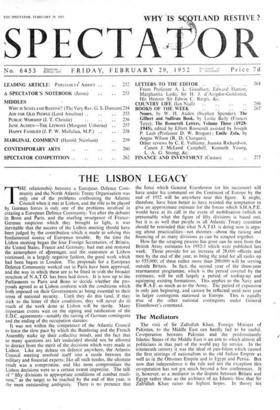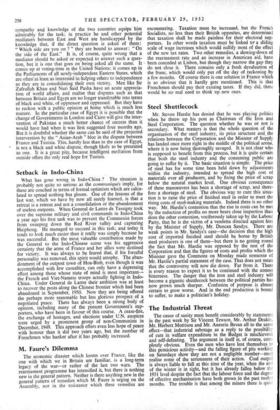The Mediators
The visit of Sir Zafrullah Khan, Foreign Minister of Pakistan, to the Middle East can hardly fail to be useful. Co-operation between Pakistan and the predominantly Islamic States of the Middle East is an aim to which almost all politicians in that part of the world pay lip service. In the nineteenth century it was the ideal of pan-Islam which caused the first stirrings of nationalism in the old Indian Empire as well as in the Ottoman Empire and in Egypt and Persia. But now that independence is the rule and not the exception this co-operation has not got much beyond a few conferences. It is, however, as a mediator in the dispute between Britain and Egypt rather than as the architect of an Islamic bloc that Sir Zafrullah Khan raises the highest hopes. In theory his sympathy and knowledge of the two countries equips him admirably for the task; in practice he and other potential mediators between East and West are handicapped by the knowledge that, if the direct question is asked of them: "Which side are you on ? " they are bound to answer: "On the side of the East." It is, of course, quite wrong that a mediator should be asked or expected to answer such a ques- tion, but it is one that goes on being asked all the same. It comes up at voting-time in the United Nations; it comes up in the Parliaments of all newly-independent Eastern States, which are often'at least as interested in helping others to independence as they are in consolidating their own victory. Men like Sir Zafrullah Khan and Nun Said Pasha have an acute apprecia- tion of world affairs, and realise that disputes such as that between Britain and Egypt are no longer translatable into terms of black and white, of oppressor and oppressed. But they have to reckon with a public opinion at home which is much less mature. In the particular case of Egypt it is possible that the change of Governments in London and Cairo will give the inter- vention of Pakistan a much better chance of success than it would have had when it was first suggested four months ago. But it is doubtful whether the same can be said of the projected intervention by the " Asian-Arab " bloc in the dispute between France and Tunisia. This, hardly less than in the case of Egypt, is not a black and white dispute, though likely to be presented as one. It is a great pity, because intelligent mediation from outside offers the only real hope for Tunisia.



































